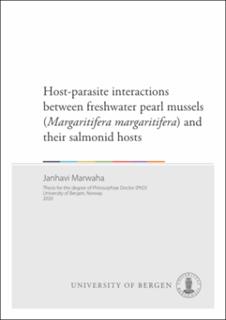| dc.contributor.author | Marwaha, Janhavi | |
| dc.date.accessioned | 2020-04-21T07:48:01Z | |
| dc.date.available | 2020-04-21T07:48:01Z | |
| dc.date.issued | 2020-04-29 | |
| dc.date.submitted | 2020-04-01T12:48:02.698Z | |
| dc.identifier | container/27/c0/8b/76/27c08b76-a478-4be3-91a4-02ec8251bef6 | |
| dc.identifier.uri | http://hdl.handle.net/1956/21947 | |
| dc.description.abstract | The freshwater pearl mussel, Margaritifera margaritifera, is an endangered bivalve which has suffered a serious decline across its Holarctic distribution. It has a complex life cycle which involves an obligate parasitic stage on a suitable host. M. margaritifera populations are very host specific, and they are able to metamorphose only on the gills of Atlantic salmon (Salmo salar), sea trout (Salmo trutta f. trutta) or brown trout (S. trutta f. fario). Currently, the main concern is the lack of juvenile recruitment and survival in organically enriched river sediments. Consequently, several conservation programmes are rearing mussels in hatcheries, for eventual release back into their natural habitat when they are older and better able to survive. Although M. margaritifera do not reproduce on their hosts, their survival is highly dependent on the presence of suitable hosts. The main purpose of this study was to improve our understanding of the host-parasite interactions and their influence on glochidial or juvenile mussel fitness, with the aim of providing information that could be used to refine future conservation strategies. In the first experiment, the duration of the parasitic phase had a significant positive influence on post parasitic fitness of juvenile mussels in eight populations in Norway. Fitness was measured as size at excystment, post parasitic growth and survival. The strong positive relationship observed between the test variables clearly indicated that glochidial growth and development were dependent on individual host-parasite compatibility. In the same experiment, temperature was also observed to be an important factor governing excystment of juvenile mussels, with higher temperatures decreasing the duration of the parasitic phase. The variation in host suitability has been linked to environmental conditions, host age and/or size, genetic composition of the host and parasite, or a combination of these factors. Therefore, in the second experiment, the effect of host age on glochidial infestation was examined under common garden conditions. Hosts (0+ and 1+) were infested with glochidia from closely related mothers in order to remove the confounding effects of genotype-specific host interactions. A host age dependent immune response was observed, i.e. the 0+ hosts displayed a resistant strategy, whereas the 1+ hosts displayed a tolerant one. In the second and third experiments, the virulent effects of glochidia on their hosts were examined, and measured as haematocrit values and host mortality respectively. Haematocrit values were significantly elevated in heavily infested hosts, which indicated respiratory distress (Chapter 3). In addition, glochidia were highly virulent on the less suitable host species, resulting in high mortalities of infested hosts (Chapter 4). Both these results display the parasitic nature of M. margaritifera in the host-parasite interaction. In the third experiment, the hypothesis that glochidia from a single mother could infest both salmon and trout hosts was examined. The results showed that glochidia from a population that uses salmon as its principal host were able to infest both species, but some mothers displayed a bias for either salmon or trout. These observations were probably a result of the higher genetic diversity observed in salmon-mussel populations. Individual and population level genetic diversity is associated with species fitness and an ability to adapt to a changing environment, which can help ensure long-term survival. All the results of this study clearly indicate that the degree of host-parasite compatibility has an influence on glochidial and juvenile mussel fitness. Further studies should investigate factors that influence host-parasite interactions, for example the diversity of the genes of the host major histocompatibility complex (MHC). Based on the results, it is recommended that naive 1+ hosts are preferably used in captive breeding programmes, as this will maximise the production of juvenile mussels. The use of high quality hosts will also minimise the possible selection and genetic drift effects. Such effects lead to a deterioration in the evolutionary potential to adapt to a changing environment. Since glochidial development and successful metamorphosis into juvenile mussels is highly dependent on good host condition and survival, it is recommended that conservation efforts should focus on methods that can guarantee this. | en_US |
| dc.language.iso | eng | eng |
| dc.publisher | The University of Bergen | en_US |
| dc.relation.haspart | Chapter 2: Marwaha, J., Jensen, K.H., Jakobsen, P.J. and Geist, J. (2017). Duration of the parasitic phase determines subsequent performance in juvenile freshwater pearl mussels (Margaritifera margaritifera). Ecology and Evolution, 7 (5), pp 1375-1383. The article is available at: <a href="http://hdl.handle.net/1956/17565" target="blank">http://hdl.handle.net/1956/17565</a> | en_US |
| dc.relation.haspart | Chapter 3: Marwaha, J., Aase, H., Geist, J., Stoeckle, B.C., Kuehn, R. and Jakobsen, P.J. (2019). Host (Salmo trutta) age influences resistance to infestation by freshwater pearl mussel (Margaritifera margaritifera) glochidia. Parasitology Research, 118 (5), pp 1519-1532. The accepted version is available in the main thesis. The published version is available at: <a href="https://doi.org/10.1007/s00436-019-06300-2" target="blank">https://doi.org/10.1007/s00436-019-06300-2</a> | en_US |
| dc.relation.haspart | Chapter 4: Marwaha, J., Jakobsen, P.J., Karlsson, S., and Wacker, S.W. (2019). Differential glochidial virulence and host bias of individual mothers observed in the freshwater pearl mussel (Margaritifera margaritifera) salmonid host-parasite system. The article is not available in BORA. | en_US |
| dc.rights | In copyright | eng |
| dc.rights.uri | http://rightsstatements.org/page/InC/1.0/ | eng |
| dc.title | Host-parasite interactions between freshwater pearl mussels (Margaritifera margaritifera) and their salmonid hosts | en_US |
| dc.type | Doctoral thesis | |
| dc.date.updated | 2020-04-01T12:48:02.698Z | |
| dc.rights.holder | Copyright the Author. All rights reserved | en_US |
| dc.contributor.orcid | https://orcid.org/0000-0002-8644-642X | |
| fs.unitcode | 12-60-0 | |
